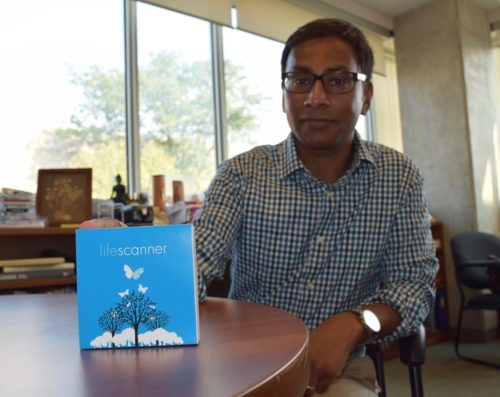You can now hold the power to detect food fraud or identify living species in the palm of your hand.
The University of Guelph has launched LifeScanner, a personal DNA identification kit created by associate director of informatics Sujeevan Ratnasingham at the Centre for Biodiversity Genomics as a step towards making DNA technology available to the public.
Ratnasingham is also a part of the innovative BIOSCAN project led by biologist Paul Hebert at the University of Guelph and LifeScanner is a spinout from the overarching project called the International Barcode of Life.
The kits are available online. Users can simply open the LifeScanner app on their phone, scan the vial in the kit, take a photo of the specimen they want to identify, take a photo of the environment it was found, take a sample with provided sterilized tweezers and mail it to the Centre of Biodiversity Genomics lab where it takes about six to eight business days before the results head back.
Ratnasingham says Lifescanner will be used for primarily four different purposes. For food authentication, changing the way people interact with nature, conservation of wildlife, and the fourth is a project catered to Guelph farmers to detect pests in their farms called Food From Thought.
“ It's clear that food supply chains have become more complex and more global so having checks and balances along the way is needed and DNA is one part of the solution,” says Ratnasingham.
Ratnasingham says all biological beings have DNA and it is very difficult, if not impossible to cheat DNA testing.
“DNA has become the new standard of truth,” says Ratnasingham.
With food authentication, LIfeScanner is able to point errors and even allow customers to provide honest reviews about the authenticity of the food being served and ultimately affect people’s purchasing behaviour.
By also providing this technology to industries, retailers can see these problems in advance before they reach their customers.
Ratnasingham also gives the example of food fraud affecting the environment when one is served a different food than the one they chose thinking they were making a sustainable choice.
“Seafood is particularly important because it affects the environment and marine environment very badly when mismanaged. So for LifeScanner, its really about helping people make sustainable choices,” says Ratnasingham.
“So ensuring that people can make those sustainable choices is really a priority for us.”
Ratnasingham says the team plans on expanding to other food areas including packaged food and pet food.
“Pet food is another area where altered food material goes into that and pet owners also want to make sustainable choices and want to make sure their pets are receiving high-quality food instead of substitute,” says Ratnasingham.
That's all just one area where life scanner is being used.
Ratnasingham says another area is the way people interact with nature such as insects like ticks or mosquitoes that carry diseases.
“We provide a simple commercial solution that is low cost for anyone to identify a tick that has been attached to their pets or their child or themselves. You can ask the question, are any of these species mosquitoes ones that are known to carry West Nile Virus?" says Ratnasingham.
“Especially with climate change. We're starting to see more of the pest that are further south latitudinally that have moved North over time.”
Ratnasingham gives the example of an experiment he is currently conducting in his backyard. He says he is surprised to see just how many of the species of weed and even plants growing in his backyard are imported or invasive.
“You expect wild areas on the side of the road where things are growing. How many of those are actually native to the region and how many are invasive coming from Europe or have come in from Europe in the past?” says Ratnasingham.
“Its really about engaging and what I find at least for me, is when you can answer just one question, you start a hundred more and you really care and engage about the environment.”
The third area LifeScanner is focusing on is wildlife in South Africa right where the kits are being used by wildlife agents, law enforcement agents and conservation enforcement agents to detect cases of poaching and illegal trafficking or protected species.
The information submitted to the LifeScanner lab by users will also help expand the library of BIOSCAN.
Ratnasingham says while BIOSCAN is focused more on the wild environment, LifeScanner is a more precision-based collection where people can collect things of particular interest.
The fourth area of LifeScanner is part of a University of Guelph project called Food for Thought where LifeScanner is playing a role in farmers’ ability to detect pests on their farms before spraying.
Ratnasingham says it's important to have a targeted approach to keep the best interest of the environment and the farmers in mind because blindly spraying pesticide on the crops when there is an alternate and a less harmful solution is unnecessary.
“Having knowledge about the organisms changes the way we approach these problems and the way we interact with life," says Ratnasingham.
Ratnasingham says the team hopes to boost the use of this technology by lowering the wait times for lab results in the future so DNA testing becomes common in every household.
